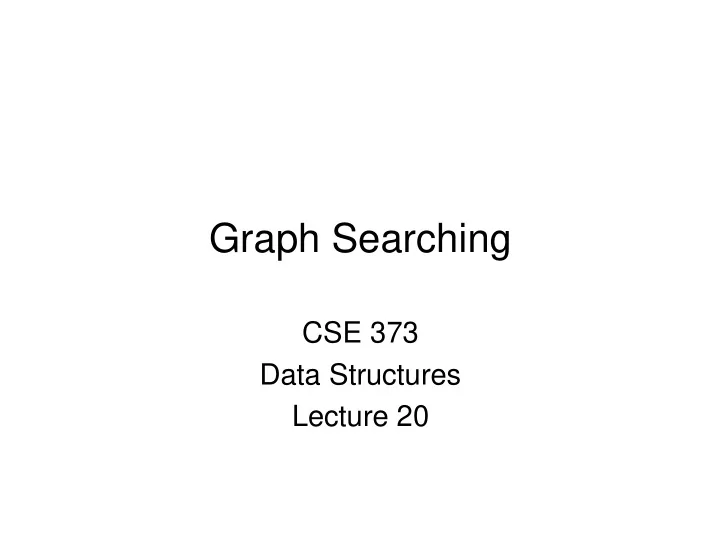

Graph Searching CSE 373 Data Structures Lecture 20
Readings • Reading › Sections 9.5 and 9.6 3/7/03 Graph Searching - Lecture 20 2
Graph Searching • Find Properties of Graphs › Spanning trees › Connected components › Bipartite structure › Biconnected components • Applications › Finding the web graph – used by Google and others › Garbage collection – used in Java run time system › Alternating paths for matching 3/7/03 Graph Searching - Lecture 20 3
Graph Searching Methodology Breadth-First Search (BFS) • Breadth-First Search (BFS) › Use a queue to explore neighbors of source vertex, then neighbors of neighbors etc. › All nodes at a given distance (in number of edges) are explored before we go further 3/7/03 Graph Searching - Lecture 20 4
Graph Searching Methodology Depth-First Search (DFS) • Depth-First Search (DFS) › Searches down one path as deep as possible › When no nodes available, it backtracks › When backtracking, it explores side-paths that were not taken › Uses a stack (instead of a queue in BFS) › Allows an easy recursive implementation 3/7/03 Graph Searching - Lecture 20 5
Depth First Search Algorithm • Recursive marking algorithm • Initially every vertex is unmarked DFS(i: vertex) mark i; for each j adjacent to i do if j is unmarked then DFS(j) end{DFS} Marks all vertices reachable from i 3/7/03 Graph Searching - Lecture 20 6
DFS Application: Spanning Tree • Given a (undirected) graph G(V,E) a spanning tree of G is a graph G’(V’,E’) › V’ = V, the tree touches all vertices (spans) the graph › E’ is a subset of E such G’ is connected and there is no cycle in G’ › A graph is connected if given any two vertices u and v, there is a path from u to v 3/7/03 Graph Searching - Lecture 20 7
Example of DFS: Graph connectivity and spanning tree 2 DFS(1) 1 7 3 5 6 4 3/7/03 Graph Searching - Lecture 20 8
Example Step 2 2 DFS(1) 1 7 DFS(2) 3 5 6 4 Red links will define the spanning tree if the graph is connected 3/7/03 Graph Searching - Lecture 20 9
Example Step 5 2 DFS(1) 1 7 DFS(2) DFS(3) 3 DFS(4) DFS(5) 5 6 4 3/7/03 Graph Searching - Lecture 20 10
Example Steps 6 and 7 2 DFS(1) 1 7 DFS(2) DFS(3) 3 DFS(4) DFS(5) 5 DFS(3) 6 DFS(7) 4 3/7/03 Graph Searching - Lecture 20 11
Example Steps 8 and 9 2 DFS(1) 1 7 DFS(2) DFS(3) 3 DFS(4) DFS(5) 5 DFS(7) 6 4 3/7/03 Graph Searching - Lecture 20 12
Example Step 10 (backtrack) 2 DFS(1) 1 7 DFS(2) DFS(3) 3 DFS(4) DFS(5) 5 6 4 3/7/03 Graph Searching - Lecture 20 13
Example Step 12 2 DFS(1) 1 7 DFS(2) DFS(3) 3 DFS(4) DFS(6) 5 6 4 3/7/03 Graph Searching - Lecture 20 14
Example Step 13 2 DFS(1) 1 7 DFS(2) DFS(3) 3 DFS(4) DFS(6) 5 6 4 3/7/03 Graph Searching - Lecture 20 15
Example Step 14 2 DFS(1) 1 7 DFS(2) DFS(3) 3 DFS(4) 5 6 4 3/7/03 Graph Searching - Lecture 20 16
Example Step 17 2 DFS(1) 1 7 3 5 6 4 All nodes are marked so graph is connected; red links define a spanning tree 3/7/03 Graph Searching - Lecture 20 17
Adjacency List Implementation • Adjacency lists 2 G 1 M 7 1 0 2 4 6 2 0 3 1 7 3 3 0 4 5 4 0 5 6 1 3 5 5 0 3 7 4 6 0 1 4 6 7 0 5 2 4 Index next 3/7/03 Graph Searching - Lecture 20 18
Connected Components 2 1 3 7 10 4 9 5 6 8 11 3 connected components 3/7/03 Graph Searching - Lecture 20 19
Connected Components 2 1 3 7 10 4 9 5 6 8 11 3 connected components are labeled 3/7/03 Graph Searching - Lecture 20 20
Depth-first Search for Labeling Connected components Main { i : integer for i = 1 to n do M[i] := 0; label := 1; for i = 1 to n do if M[i] = 0 then DFS(G,M,i,label); label := label + 1; } DFS(G[]: node ptr array, M[]: int array, i,label: int) { v : node pointer; M[i] := label; v := G[i]; while v ≠ null do if M[v.index] = 0 then DFS(G,M,v.index,label); v := v.next; } 3/7/03 Graph Searching - Lecture 20 21
Performance DFS • n vertices and m edges • Storage complexity O(n + m) • Time complexity O(n + m) • Linear Time! 3/7/03 Graph Searching - Lecture 20 22
Breadth-First Search BFS Initialize Q to be empty; Enqueue(Q,1) and mark 1; while Q is not empty do i := Dequeue(Q); for each j adjacent to i do if j is not marked then Enqueue(Q,j) and mark j; end{BFS} 3/7/03 Graph Searching - Lecture 20 23
Can do Connectivity using BFS • Uses a queue to order search 2 1 7 3 5 6 4 Queue = 1 3/7/03 Graph Searching - Lecture 20 24
Beginning of example 2 1 7 3 5 6 4 Mark while on queue Queue = 2,4,6 to avoid putting in queue more than once 3/7/03 Graph Searching - Lecture 20 25
Depth-First vs Breadth-First • Depth-First › Stack or recursion › Many applications • Breadth-First › Queue (recursion no help) › Can be used to find shortest paths from the start vertex › Can be used to find short alternating paths for matching 3/7/03 Graph Searching - Lecture 20 26
Minimum Spanning Tree • Edges are weighted: find minimum cost spanning tree • Applications › Find cheapest way to wire your house › Find minimum cost to wire a message on the Internet 3/7/03 Graph Searching - Lecture 20 27
Recommend
More recommend